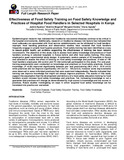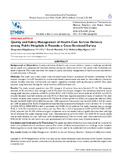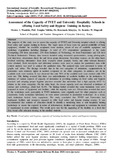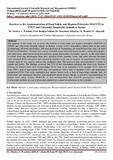Effectiveness of Food Safety Training on Food Safety Knowledge and Practices of Hospital Food Handlers in Selected Hospitals in Kenya

View/
Date
2014-06Author
Nyamari, J.
Mugendi, Beatrice J.
Keraka, M.
Agwata, D.
Metadata
Show full item recordAbstract
Epidemiological research has indicated that foodborne nosocomial diseases continue to be critical in the hospital environments. Additionally, research on foodborne disease risk factors has indicated that most outbreaks are associated with food service establishments can be attributed to food handlers’ improper food handling practices and observation studies have revealed that food handlers frequently engage in unsafe food hygiene practices. Food safety training has been identified as a way to assure public health, yet evidence supporting the effectiveness of training has been remains inconclusive. The objective of this study was to assess food safety knowledge and practices of food handlers working in selected hospitals in Kenya before and after food safety training. This study employed a quasi experimental study design. A systematic random sample of 42 hospitals in kenya was selected to assess the effect of training on food safety knowledge and practices. A total of 140
food handlers employees (68 control and 73 interventional) participated in this study. Pre and post- training assessments were conducted on knowledge and practices on food safety practices. Overall knowledge (P <0.05) improved significantly between pre- and post-training (56.5 ±16.5 - 87.8 ±15.5) while practices did not improve significantly (101.3±11.6 - 105.3±12.2), however some improvements were observed in some individual practices that were examined independently. Results indicated that training can improve knowledge but might not always improve practices. The results of this study support the assumption that the development and delivery of a food safety education training for food handlers would increase food safety knowledge and practices. Yet, increasing knowledge is not a guarantee that practices will change as demonstrated by high scores in knowledge and low scores in practices. Future studies investigating on ways in which acquired food safety knowledge can be translated into practice are warranted.
Collections
- Journal Articles (PAS) [273]
Related items
Showing items related by title, author, creator and subject.
-
Quality and Safety Management of Health Care Service Delivery among Public Hospitals in Rwanda: a Cross-Sectional Survey
Ndagijimana, D.; Mureithi, C.; Ngomi, Nicholas N. (2019-10)Background or Objectives: Quality and safety of health care service delivery remain a challenge worldwide due to unsafe care, inappropriate practices, adverse events and medication errors that result in harm, disability ... -
Assessment of the Capacity of TVET and University Hospitality Schools in offering Food Safety and Hygiene Training in Kenya
Wandolo, Monica A.; Ndiritu, Douglas.; Khayiya, Rosemarie.; Mugendi, Beatrice J. (International Journal of Scientific Research and Management (IJSRM) ||Volume||06||Issue||06||Pages||EM-2018-467-480||2018||, 2018)The purpose of this study was to assess the capacity of TIVET and University hospital schools in offering food safety and hygiene training in Kenya. The major areas of focus were the general availability of basic equipment, ... -
Barriers to the Implementation of Food Safety and Hygiene Principles (HACCP) in TVET and University Hospitality Schools in Kenya
Wandolo, Monica A.; Ndiritu, Douglas.; Khayiya, Rosemarie.; Mugendi, Beatrice J. (International Journal of Scientific Research and Management (IJSRM) ||Volume||06||Issue||07||Pages||EM-2018-544-556||2018||, 2018)The purpose of this study was to assess the barriers to food safety and hygiene principles (HACCP) in TIVET and University hospital schools in Kenya. A total of 671 respondents participated in the study (Comprising 249 ...



